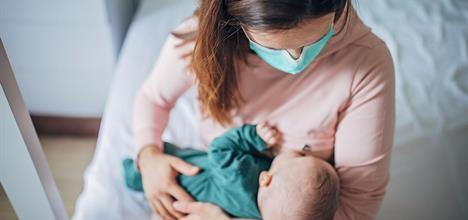
The outbreak of COVID-19 is a stressful time for everyone. This may be especially true for mothers who are breastfeeding and concerned about their baby’s health. However, new moms can successfully start and maintain breastfeeding during the pandemic, with some recommended precautions.
Benefits of breastfeeding during a pandemic
- Breastfeeding is good for babies. It protects them from many infections. While it is still not clear if this is true for the COVID-19 virus, breastfed infants are generally less likely to have severe respiratory symptoms when they get sick.
- Breastfeeding is good for moms. Hormones released in the mother’s body during breastfeeding promote wellness and can relieve stress and anxiety.
- Breast milk is readily available. No purchase necessary!
Is breastfeeding and expressed breast milk feeding safe during the COVID-19 pandemic?
COVID-19 spreads between people who are in close contact, mainly through respiratory droplets when an infected person coughs, sneezes, or talks. To date, there is no evidence that COVID-19 is passed from mother to baby in breastmilk. Breastfeeding has been shown to be safe when a mom has other illnesses like the flu.
Can my baby continue breastfeeding or drinking expressed breast milk if I test positive for COVID-19 or if I am a person under investigation?
Yes, babies can still receive breast milk even if you test positive for COVID-19. It is recommended that you pump or express your breast milk after carefully cleaning your breasts and hands and have a healthy caregiver feed your baby the expressed breast milk.
It’s also very important to clean your breast pump after each use. Follow CDC guidelines for proper cleaning and disinfecting recommendations.
Remind all caregivers to wash hands thoroughly before touching bottles, or feeding or caring for your baby. If you decide to breastfeed directly, take all the recommended steps to prevent the potential spread of the virus, including using a mask and following careful breast and hand hygiene.
If I have COVID-19, can I stay in the same room with my infant?
If you have COVID-19 or are suspected of having COVID-19, staying in a different room from your baby is the safest way to keep your newborn healthy. A healthy caregiver should take care of the baby and can feed expressed breast milk.
If you and your family decide to keep your baby in the same room as you, keep a distance of at least 6 feet from your baby. When closer than 6 feet, wear a mask and make sure your hands are clean.
If you have COVID-19, you can stop isolating yourself from your baby once you are fever-free without use of fever medicines (acetaminophen or ibuprofen) for at least 72 hours; when your other symptoms of COVID-19 are improving; and when at least 7 days have passed since your symptoms started.
Tip: Ask your pediatrician for help with getting your baby to latch on again once you can restart breastfeeding.
How can I maintain my milk supply if I am sick with COVID-19?
Hand pumping and hand expressing breast milk is especially helpful in the first few days after your baby is born to get the milk supply going. Frequent pumping (or breastfeeding if you have chosen to directly breastfeed and are following the strict precautions noted above) should line up with your infant’s feeding demands, about 8-10 times in a 24-hour period.
Most medications are safe to take while breastfeeding, but always check with your doctor.
While this may be a stressful time, try to stay optimistic and practice healthy habits to reduce stress as much as possible. This includes getting enough sleep, eating plenty of healthy foods, and getting regular exercise.
Do not hesitate to ask for help if you have trouble with feeding, nipple pain, low milk supply, or with any other concerns.
How can I protect my infant from COVID-19 infection?
Wash your hands often with soap and water for at least 20 seconds. If soap and water are not available, use hand sanitizer. Look for one that is 60% or higher alcohol-based. Avoid touching your face, eyes, nose, or mouth with unwashed hands. Also, be sure to clean visibly dirty or possibly contaminated surfaces your infant may touch.
If you feel sick, be extra careful to cough or sneeze into your sleeve or a tissue. Throw away used tissues immediately and wash your hands.
Practice physical distancing by avoiding public spaces and stay 6 feet away from others whenever possible. And be sure that everyone in your home avoids close contact with anyone with respiratory symptoms such as coughing or individuals with probable COVID-19.
Your pediatrician is here to help
After leaving the hospital, it is important that your baby’s first follow-up visit happen in person so your baby can be measured and weighed accurately. Many doctors are scheduling newborn visits during specific times (such as first thing in the morning) to limit exposure to sick patients. While some doctors are also doing more work via phone and video, this is not the best option for newborns.
Remember
Breastfeeding is a key preventive health step for baby and mother, even during the pandemic. Talk with your pediatrician about how to keep your baby healthy and what resources might be available in your community to help you.
Stay informed
Families are encouraged to stay up to date about this situation as we learn more about how to prevent this virus from spreading in homes and in communities.
For more parenting information from the AAP, visit www.HealthyChildren.org.
For the latest developments from the CDC, including travel warnings, new cases, and prevention advice, visit www.cdc.gov.
